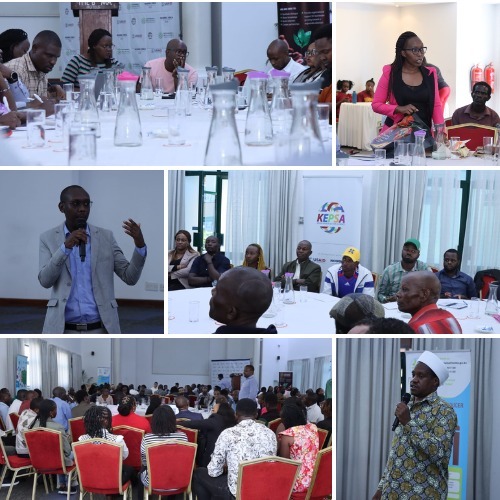KEPSA & NEMA Convene Producers, PROs & Waste Managers Amid EPR/Eco-Levy Discussions in Kenya
The Kenya Private Sector Alliance (KEPSA), through its knowledge centre, Sustainable Inclusive Business Kenya (SIB-K), and Kenya Plastics Pact in collaboration with the National Environment Management Authority (NEMA), today convened an Extended Producer Responsibility (EPR) workshop in Nairobi. The workshop was supported by USAID through Prosper Africa as part of a project to raise awareness about EPR to the private sector and their role in strengthening Kenya’s incremental transition to a circular economy.
At the workshop, producers and manufacturers presented their EPR implementation plans, highlighting key preventive measures to recover product waste at the post-consumer stage. Over 150 participants, comprising producers, manufacturers, PROs, and informal waste pickers, participated in the workshop to deliberate on practical strategies for the private sector to strengthen the EPR implementation. Moreover, the workshop was a key knowledge co-creation and information-sharing session on collective action to champion compliance with circular economy principles and strategies to evoke positive consumer behavior change.
Speaking at the workshop, Dr. Ayub Macharia, the Director of Environmental Compliance at the National Environment Management Authority (NEMA), highlighted the importance of the Sustainable Waste Management Act 2022 and the Drafted EPR Regulations, which aim to guide Kenya towards sustainable development. He urged producers and manufacturers to create clear EPR plans that include measures to recover their waste from all counties, individually or collectively. “Successful EPR implementation in Kenya depends on raising consumer awareness about proper waste disposal, involving informal waste pickers, and ensuring that PROs and producers are committed to increasing waste collection and recycling.”
Dennis Kiplagat, the Project Officer at Sustainable Inclusive Businees, highlighted KEPSA’s efforts in the private sector to promote sustainability by educating its members about their roles in EPR implementation. He noted that the private sector is crucial in supporting Kenya’s transition to a circular economy by adopting practical strategies to reduce waste, such as using alternative packaging materials. “The private sector can also invest in research and development to find and implement innovative technologies that enhance waste collection and recycling, improve waste transportation efficiency, and spread information about EPR and circular economy principles,” said Kiplagat.
During the workshop’s breakout sessions, producers and PROs had the chance to educate informal waste sector actors about their products, the estimated volume of waste generated, and pricing for waste recovery. Key concerns raised included fair compensation for informal waste actors and waste service providers, better coordination between PROs and their members to recover waste, and producers’ efforts to reduce waste generation. Participants stressed the need for ongoing engagement among producers, PROs, NEMA, and other stakeholders to establish fair pricing for different types of waste. They also recognized the significant role of informal waste actors in waste management despite often being overlooked. Ensuring fair compensation for these stakeholders is crucial for their well-being and for creating sustainable waste management systems.
The workshop comes amid the ongoing debate on the similarities between the EPR and the proposed Eco-levy under Clause 45 (7b) of the Finance Bill 2024. Eco levy will be levied on certain goods set out in the fourth schedule of the Finance Bill 2024 manufactured in Kenya or imported into Kenya and paid by the manufacturer and the importer, respectively. The eco levy will be due and payable when the goods are removed from the excise stock room, in the case of locally manufactured goods, and at the time of entry of the goods into the country, in the case of imported goods. The eco levy applies to various goods, including all plastic packaging materials, whose rates are set at Ksh. 150 per kg. The Finance Bill 2024 also gives the Cabinet Secretary the power to make regulations to implement the eco levy better.
Following the above, the private sector has raised concerns over the implications for specific businesses, such as those under the Kenya Plastics Pact, and the general economy, society, and environment. In a social media statement by Dr. Macharia on 30th May, he clarified the differences between EPR and the Eco-levy, saying, “EPR caters for post consumer aspect of waste management to ensure that the waste is collected and transported appropriately to the recyclers, incinerators or to the landfill. The collection aspect also involves appropriate compensation for the waste pickers and aggregators. It is common knowledge that even the best recycling processes leave some residue behind which needs to be disposed, normally in facilities (landfills) managed by the County Governments. Hence at the end of waste management process, the government is still left with the burden of residual waste. This is the thinking that motivated imposition of the eco-levy.”
His statement further read, “Eco-levy picks from where EPR stops and will be used for putting up infrastructure and deploying research and technology to manage the residual waste which is destined for disposal by the EPR schemes. In addition, the country has suffered from problematic waste which lies in our dumpsites. This existing or legacy waste need to be managed so that it doesn’t continue polluting the environment. This is an expensive venture and participation of those responsible for introducing problematic waste into the country is a good gesture by the government to transition into circular economy. We need reusable and recyclable products and not those destined for linear use and disposal.”
Producers have also been encouraged to redesign their products and adopt business models that use highly recyclable materials to increase the value of waste recovery at the post-consumer stage, benefiting informal waste pickers and the environment.


